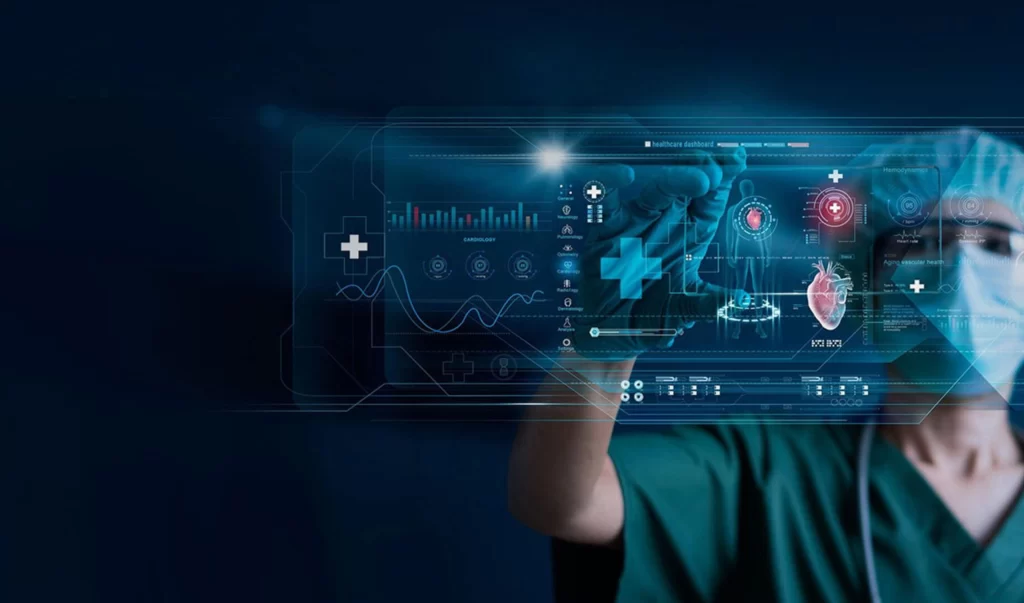The Future of Healthcare Technology : Transformative Innovations in Medical Services

Introduction:
In the dynamic healthcare landscape, technology serves as a key driver of innovation, enhancing patient outcomes and refining medical service delivery. As we enter 2024, the horizon of healthcare technology holds the promise of transformative advancements poised to revolutionize our approach to healthcare. From AI-driven diagnostics to telemedicine platforms, these innovations are set to redefine the standards of patient care, ushering in an era of proactive and personalized healthcare solutions. Embracing these advancements will empower healthcare professionals to optimize treatment strategies, improve accessibility, and ultimately, enhance the well-being of individuals worldwide.
Personalized Medicine and Precision Healthcare
A pivotal stride in healthcare technology is the transition towards personalized medicine and precision healthcare. Breakthroughs in genomics, data analytics, and AI have empowered healthcare providers to customize treatments and interventions for each patient, considering their genetic predispositions, lifestyle choices, and distinct health characteristics. This personalized approach not only enhances the effectiveness of treatments but also reduces adverse effects, thereby fostering improved patient outcomes and a higher quality of life. With tailored medical interventions, individuals receive care that is uniquely suited to their specific needs, maximizing therapeutic benefits while minimizing risks. This shift towards personalized medicine marks a significant advancement in healthcare, promising a future where treatments are precisely tailored to each patient’s genetic makeup and health profile, ultimately revolutionizing the way healthcare is delivered and experienced.
Telemedicine and Remote Patient Monitoring
The COVID-19 pandemic has spurred a rapid uptake of telemedicine and remote patient monitoring technologies, catalyzing a profound transformation in the healthcare delivery landscape. Telemedicine platforms and wearable devices embedded with sophisticated sensors enable patients to access medical consultations, track vital signs, and manage chronic ailments remotely, all from the confines of their homes. This paradigm shift enhances the accessibility of healthcare services, particularly in marginalized regions, while also yielding significant cost savings and curbing hospital readmissions. Patients benefit from the convenience and flexibility of remote healthcare solutions, while healthcare providers extend their reach and deliver timely interventions, fostering better health outcomes and patient satisfaction. As telemedicine continues to evolve and integrate with traditional care modalities, it promises to reshape the healthcare paradigm, democratize access to quality care, and pave the way for a more patient-centric approach to medicine in the years ahead.
Artificial Intelligence in Diagnostics and Treatment Planning
Artificial intelligence (AI) remains at the forefront of transforming diagnostics and treatment planning within the healthcare sector. By 2024, AI-driven imaging and diagnostic systems have achieved remarkable feats, analyzing medical images, pathology slides, and patient data swiftly and with unparalleled accuracy. This capability facilitates the early detection of diseases and enables healthcare professionals to devise treatment plans with greater precision than ever before. Moreover, AI-powered clinical decision support systems empower healthcare providers by furnishing them with evidence-based insights, thereby enhancing diagnostic accuracy and improving patient care outcomes. As AI continues to evolve and integrate seamlessly into healthcare workflows, its impact on diagnostics and treatment planning is poised to deepen further, ushering in an era of more effective and personalized healthcare delivery. With AI as a steadfast ally, healthcare professionals can navigate complex medical scenarios with confidence, ultimately leading to better health outcomes and improved quality of care for patients across the globe.
Remote Surgery and Robotic-Assisted Procedures
Advancements in robotic surgery and remote surgical techniques are reshaping the landscape of surgical care. Robotic-assisted surgical systems equipped with AI algorithms and haptic feedback technology enable surgeons to perform minimally invasive procedures with enhanced precision and dexterity. Furthermore, remote surgery platforms facilitate surgeries on patients in remote or inaccessible areas, extending access to specialized surgical care and expertise. This integration of technology into surgical practices not only enhances surgical precision and efficiency but also expands the reach of healthcare services to underserved populations. As robotic and remote surgical technologies continue to evolve, they hold the potential to revolutionize surgical care, improving patient outcomes and reducing the need for invasive procedures. By embracing these advancements, healthcare providers can deliver high-quality surgical care to patients regardless of geographical constraints, ultimately enhancing the overall effectiveness and accessibility of surgical services.
Blockchain in Healthcare Data Management
Blockchain technology is gaining traction in healthcare for its potential to improve data security, interoperability, and transparency. Blockchain-based platforms facilitate secure and decentralized storage of electronic health records (EHRs), enabling patients to maintain ownership and control over their medical data. Additionally, blockchain-powered systems streamline administrative processes, reduce data breaches, and ensure compliance with privacy regulations, enhancing trust and efficiency in healthcare data management. This adoption of blockchain technology holds promise for revolutionizing healthcare data management practices, fostering greater patient empowerment and privacy protection. As healthcare organizations increasingly embrace blockchain solutions, the industry stands to benefit from improved data integrity, enhanced interoperability and heightened security standards, ultimately advancing the delivery of quality patient care.
Conclusion: Embracing the Technological Revolution in Healthcare
In conclusion, as we stand at the forefront of healthcare technology in 2024, it’s clear that transformative innovations are reshaping the landscape of medical services and patient care. The integration of personalized medicine, telemedicine, AI-driven diagnostics, and robotic-assisted surgeries holds immense promise for improving healthcare accessibility, affordability, and quality on a global scale. By embracing this technological revolution, we have the opportunity to pave the way for a future where better health outcomes and enhanced patient experiences are not just aspirations, but achievable realities. As we continue to leverage cutting-edge technologies, healthcare providers can deliver more tailored, efficient, and compassionate care to individuals and communities worldwide. Ultimately, this evolution signifies a shift towards a healthcare landscape that is more inclusive, equitable, and responsive to the diverse needs of patients, ushering in a new era of healthcare excellence and innovation.

